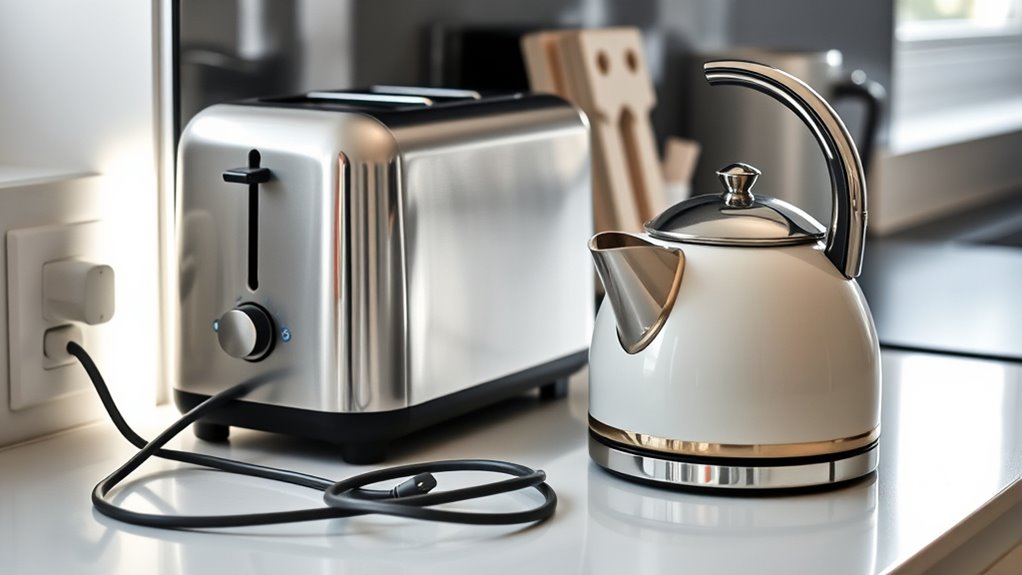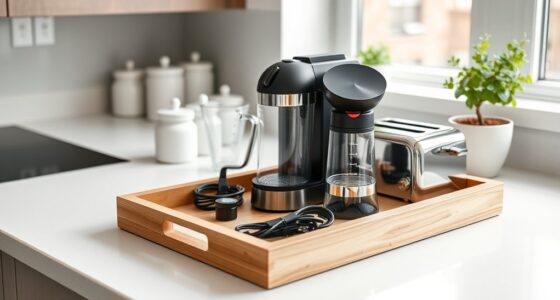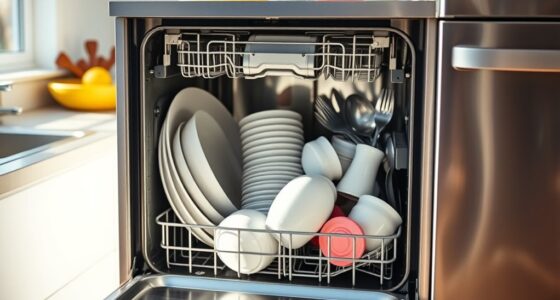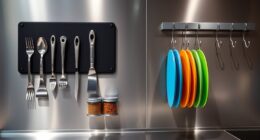To prevent fires and mishaps with small appliances, regularly inspect cords for damage and avoid forcing plugs into outlets. Unplug appliances when not in use, especially before cleaning or leaving the house, and store cords properly. Keep appliances clean, repair or replace malfunctioning units immediately, and never use them near water or hot surfaces. Proper handling and maintenance reduce risks, ensuring safer use. Continue exploring tips that can keep your home and loved ones safer.
Key Takeaways
- Regularly inspect appliance cords for damage and replace them immediately to prevent electrical fires.
- Unplug small appliances when not in use and before cleaning to avoid accidental activation.
- Keep cords away from water, hot surfaces, and avoid running them under rugs or furniture.
- Clean vents and fans regularly to prevent overheating and ensure proper airflow.
- Use appliances only for their intended purpose and ensure proper ventilation during operation.
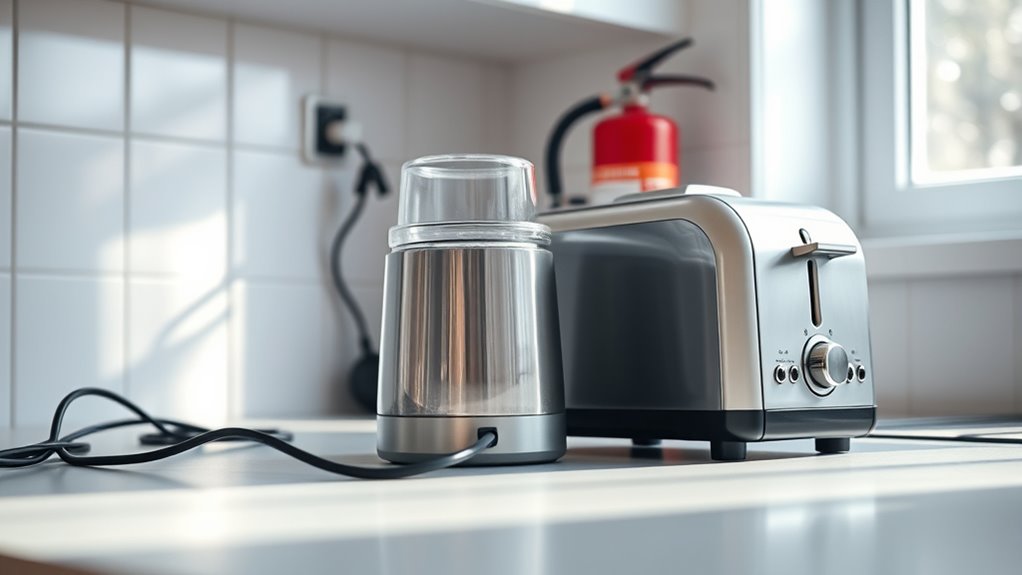
Small appliances can make your daily routines more convenient, but they also pose safety risks if not used properly. One of the most common hazards involves cord safety. Frayed, damaged, or improperly managed cords can lead to electrical shorts or fires. Always inspect your appliance cords regularly for signs of wear or damage. If you notice any fraying or cracking, replace the cord or have it repaired immediately. Never force a plug into an outlet if it doesn’t fit properly, as this can damage both the cord and the socket. Keep cords away from water, hot surfaces, and sharp objects, and avoid running them under rugs or furniture where they can become pinched or overheated. When not in use, unplug small appliances to prevent accidental activation or electrical faults, especially if you’re leaving the house or going to bed.
Proper appliance maintenance is equally important for safety. Regularly clean your appliances according to the manufacturer’s instructions to prevent dust, grease, or food buildup that can cause overheating or malfunction. For example, vacuum or wipe down vents and fans to ensure proper airflow. Check that all moving parts are functioning smoothly and that any switches or controls work correctly. If an appliance shows signs of malfunction—such as strange noises, burning smells, or inconsistent operation—stop using it immediately and have it inspected or repaired by a qualified technician. Neglecting appliance maintenance not only shortens its lifespan but also increases the risk of electrical fires or other accidents. Additionally, understanding the health benefits of fruit juice varieties can motivate healthier choices and proper use of kitchen appliances to preserve nutrients.
Frequently Asked Questions
Can I Leave Small Appliances Unattended While in Use?
You should never leave small appliances unattended while in use because it poses significant appliance monitoring challenges and increases unattended appliance risks. If you leave them, a malfunction or overheating could lead to fires or damage. Always stay nearby and supervise your appliances to guarantee safety. Turning off devices when not actively using them is the best way to prevent accidents, ensuring your home stays safe and protected from potential hazards.
Are Extension Cords Safe for Powering Small Kitchen Appliances?
Using extension cords for small kitchen appliances can be risky if you don’t follow extension cord safety guidelines. Make sure the cord is heavy-duty and rated for your appliance’s power needs. Avoid overloading it and keep appliance cord maintenance in mind—inspect cords regularly for damage. Always unplug appliances when not in use, and never run cords under rugs or furniture. Proper extension cord use helps prevent fire hazards and guarantees safe appliance operation.
How Often Should I Replace Damaged Small Appliance Cords?
Did you know that nearly 90% of electrical fires involve damaged cords? You should replace damaged small appliance cords immediately, as cord damage can considerably shorten the appliance lifespan and increase fire risk. Inspect cords regularly, and if you notice fraying, cracking, or exposed wires, don’t delay—prompt replacement ensures your safety and keeps your appliances working efficiently. Stay vigilant to prevent accidents and extend your appliance’s longevity.
What Should I Do if My Appliance Overheats?
If your appliance overheats, you should immediately unplug it to reduce overheating risks and prevent potential fires. Allow it to cool completely before inspecting for damage or blockages. Never use an appliance that continues to overheat, as this increases fire prevention concerns. Regular maintenance and avoiding overuse also help minimize overheating risks, ensuring safe operation and protecting your home from fire hazards.
Are There Specific Storage Tips to Prevent Appliance Damage?
To prevent appliance damage, focus on proper storage organization and appliance placement. Store appliances in a cool, dry area, away from direct sunlight and moisture. Keep cords neatly organized to avoid stress or damage, and make sure appliances aren’t packed tightly to allow proper ventilation. Avoid stacking appliances unless specified as safe by the manufacturer. Proper storage guarantees your appliances stay in good condition and operate safely when you need them.
Conclusion
By following these small appliance safety tips, you’re the guardian of your home, steering clear of fires and mishaps. Remember, safety isn’t just a rule—it’s your shield against chaos. Treat your appliances with respect, stay vigilant, and they’ll serve you well. Think of safety as the unseen thread weaving through your daily routine, keeping everything intact. Stay smart, stay safe, and let your home be a fortress where accidents don’t stand a chance.
